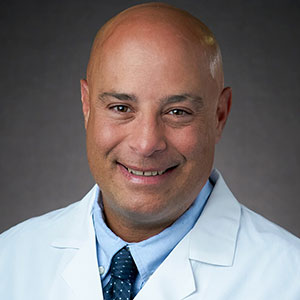The diagnosis came on Jan. 26, 2007: Stage 2A Hodgkin lymphoma.
"People don't forget the dates," says Anthony Perre, M.D., new patient intake physician at City of Hope® Cancer Center Atlanta.
In the blink of an eye, Dr. Perre went from a healthy small-town physician with a private practice to a cancer patient dealing with a life-changing diagnosis. He suddenly had a treatment plan to follow — chemotherapy followed by one month of radiation therapy. He had a practice to run, a family to consider and the accompanying wave of emotions that would ebb and crest like the daily tide.
This is when Dr. Perre learned, by experience, about what he calls the four pillars of survivorship — a coping plan for life after cancer.
"When you look at people who have gone through cancer treatment, it's like having post-traumatic stress disorder," he says. "I don’t know if I have PTSD, but I can tell you it was overwhelmingly stressful."
In the years that followed, even after he was told he had no signs of cancer, Dr. Perre remained shaken by his diagnosis. Inspired by a survivorship seminar he attended, he began to build a new foundation for his life, supported by four pillars.
"The control that people are used to having over their lives is suddenly gone during a cancer battle," Dr. Perre says. "These pillars are four things that you do have control over. They became part of a routine for my well-being."
The four pillars support a healthy lifestyle designed to not only improve quality of life, but to help reduce the risk of a recurrent or second cancer. "The desire of survivorship is not only to survive your cancer, but to live well,” he says. “What you do today influences your ability to meet that goal."
In this article, we’ll take a closer look at Dr. Perre’s four pillars of survivorship:
- Embracing a Mediterranean Diet
- Exercise and Cancer Survivorship
- The Power of Restorative Sleep
- Mindfulness Combats ‘Scanxiety’
If you’ve been diagnosed with cancer and would like to get a second opinion on your diagnosis or treatment plant, call us 24/7 at (877) 524-4673.
Embracing a Mediterranean Diet

Before his lymphoma diagnosis, Dr. Perre's was an all-out carnivore.
"It would be nothing for me to eat a steak or hamburger almost every day," he says.
He’s not alone. On average, Americans eat about 67 pounds of beef a year, according to the United States Department of Agriculture. Georgia ranks 20th in the nation in meat consumption and demand is expected to grow significantly in the next four years.
Research indicates, however, that “strong evidence” points to red meat consumption as a risk factor for colorectal cancer and that “limited evidence” links red meat to pancreatic and throat cancers. The World Health Organization says red meat is “probably carcinogenic to humans.” Red meat includes beef, veal, pork, lamb, mutton, goat and venison.
Today, Dr. Perre advocates a Mediterranean-style diet that limits the consumption of red meats and includes lots of fresh fruits and vegetables, lean meat, fish and whole grains.
"There's concrete data out there that shows that what you eat makes a difference," Dr. Perre says. "We're also finding out that alcohol and red meat and flaming our meat may add additional risk. I eat much more lean meat — chicken and fish."
Exercise and Cancer Survivorship
"I would say I was a sporadic exerciser," Dr. Perre says. "I'd get the fitness bug, and then I'd fall off."
Inspired by his wife, who took up running as a stress reliever, Dr. Perre laced up the running shoes and was soon participating in running events.
Over time, he completed a 5K, then a half marathon, then a full marathon.
"My wife and I use it as something to bond over, to do something we both enjoy,” he says. A leg injury has ended his road racing endeavors, but
Dr. Perre says he still tries to stay active.
Exercise, be it running, weights or some other activity, helps reduce stress, improve immune function and build muscle and bone mass. It also may reduce your risk of 13 types of cancer.
"The current recommendations are that a cancer survivor should do aerobic activity for at least 150 minutes each week," Dr. Perre says.
Combined, diet and exercise are the two best ways to help reduce weight and combat obesity, a key risk factor for cancer. Nearly 10% of cancers are linked to obesity. Georgia ranks 14th in the nation with 37% of its population considered obese.
The Power of Restorative Sleep
"There's a lot we don't know about sleep," Dr. Perre says.
But what we do know, he says, is that restful sleep has restorative powers that may boost your immune system and energy levels.
Poor sleep has been linked to an increase in cancer risk and recurrence. For instance, a 2015 study published in the Journal of Sleep and Sleep
Disorders Research suggests lack of restful sleep may lead to poor prognoses for some women with breast cancer.
"Women with breast cancer who were frequent snorers and reported less than six hours of sleep per night had the poorest prognosis versus never-snorers who slept seven to eight hours per night," the study found.
Mindfulness Combats ‘Scanxiety’
Dr. Perre's tests and scans have shown no sign of cancer for years now. But every year, a little “scanxiety” sets in.
"It's the anxiety you have around the time of your scans," he says.
So, Dr. Perre practices mindfulness to help reduce his stress and look at life through a more positive lens.
Mindfulness means different things to different people. In general, though, it's a way of letting go of your anxieties and finding peace within yourself. "Some people are into yoga, meditation," Dr. Perre says. "I choose exercise. I am also a religious man, so the grace of God is very important to me."
City of Hope Atlanta offers patients a variety of behavioral health services to help cancer patients and their loved ones to stay grounded and better navigate the emotional roller-coaster ride of a cancer diagnosis and treatments.
“So many things are affected by your psychological or emotional health: mood, outlook, how you approach things and even self-care,” says Diane Schaab, MS, LPC, a behavioral health therapist at City of Hope Atlanta. “Mental health may impact cancer patients’ treatment decisions, the ability to complete treatment, and overall quality of life.”
Since his diagnosis, Dr. Perre’s career as a physician has flourished. He’s held multiple leadership positions at City of Hope and has been recognized numerous times by several publications as a “Top Doctor.” He’s also taken advantage of opportunities to travel. And he often goes to the beach on summer weekends and tries to enjoy life.
"Outlook makes a difference,” he says. “What affects our quality of life? How do we approach things, and how do we manage bumps along the way?
What's really important? Don’t sweat the little stuff. Once you've been there and back, you realize we're all day to day."
If you’ve been diagnosed with cancer and would like to get a second opinion on your diagnosis or treatment plan, call us 24/7 at (877) 524-4673.
